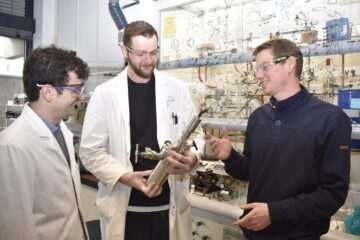Non-GMO solution to seafood allergies

Li Zhenxing led the research at the Ocean University of China. The team revealed that treating prawns with a combination of heat and irradiation significantly reduced the level of reactive proteins called allergens. They took blood from patients with shrimp allergies, added samples of treated and untreated prawn, and measured how antibodies in the blood reacted. They found that levels of ‘Pen a 1’, one of the major allergens, decreased 20-fold after treatment (Journal of the Science of Food and Agriculture DOI 10.1002/jsfa.2746).
Zhenxing’s team suggests that irradiation damages the proteins, revealing hidden reactive amino acid residues. Subsequent heating then destroys the exposed residues. “Radiation and heat seems to be a promising method for reducing the immunoreactivity” say the researchers.
Samuel Lehrer of Tulane University in New Orleans, USA, is already working on removing allergens from prawns using genetic techniques. But Zhenxing’s method could be preferable for people wary of eating genetically modified foods.
Media Contact
More Information:
http://www.chemind.orgAll latest news from the category: Life Sciences and Chemistry
Articles and reports from the Life Sciences and chemistry area deal with applied and basic research into modern biology, chemistry and human medicine.
Valuable information can be found on a range of life sciences fields including bacteriology, biochemistry, bionics, bioinformatics, biophysics, biotechnology, genetics, geobotany, human biology, marine biology, microbiology, molecular biology, cellular biology, zoology, bioinorganic chemistry, microchemistry and environmental chemistry.
Newest articles

Lower dose of mpox vaccine is safe
… and generates six-week antibody response equivalent to standard regimen. Study highlights need for defined markers of mpox immunity to inform public health use. A dose-sparing intradermal mpox vaccination regimen…

Efficient, sustainable and cost-effective hybrid energy storage system for modern power grids
EU project HyFlow: Over three years of research, the consortium of the EU project HyFlow has successfully developed a highly efficient, sustainable, and cost-effective hybrid energy storage system (HESS) that…

Safer alternative for an explosive reaction
The chemical industry has been using a reaction with explosive chemicals for over 100 years – now Mülheim scientists have discovered a safer alternative. The Ritter Group of the Max…





















